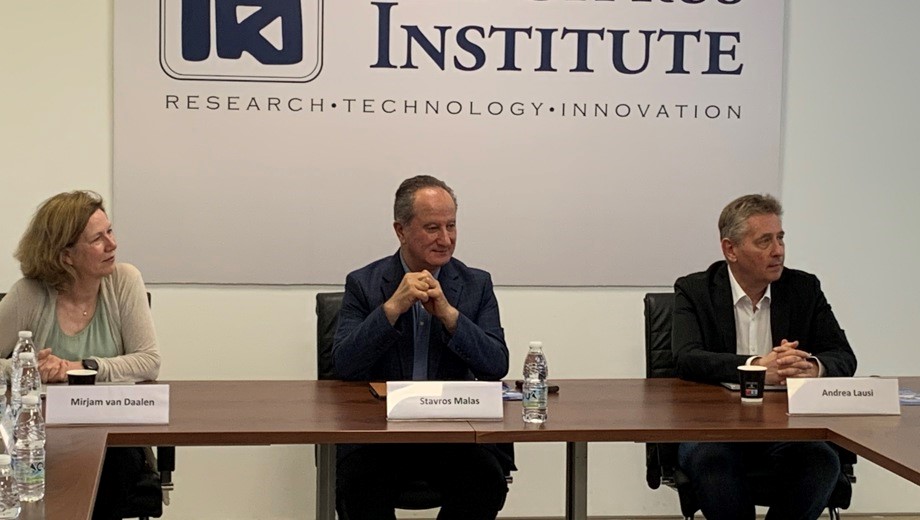
A high-level delegation from Work Package 2 (WP2) of the SUNSTONE project -funded by the EU concluded a three-day roadshow across Cyprus from 13–15 May, advancing SESAME’s mission to expand its regional user base and strengthen scientific cooperation across the Eastern Mediterranean and the Middle East.
Led by Dr Mirjam van Daalen (Paul Scherrer Institute), Dr Andrea Lausi (SESAME), and Dr Kirsi Lorentz (The Cyprus Institute), the delegation engaged stakeholders from government, academia, cultural heritage institutions, and industry — underlining the broad and growing relevance of synchrotron science in Cyprus.
A key highlight of the mission was the central role of The Cyprus Institute, whose leadership and infrastructure — particularly its BioMERA Platform (Platform for Biosciences and Human Health in Cyprus: MicroCT Enabled and Synchrotron Radiation Enabled Analyses) — are positioning Cyprus as a model for synchrotron-enabled science in the region. BioMERA’s interdisciplinary design and national relevance offer a scalable blueprint for emerging laboratories across SESAME member states. Further, The Cyprus Institute (CyI) is coordinating ENGAGE, a doctoral programme in high-performance computing funded by the European Commission through the Marie Skłodowska-Curie COFUND scheme, with SESAME as a partner.
“The Cyprus Institute plays an essential bridging role between regional ambition and global science,” said Professor Stavros Malas, President of The Cyprus Institute. “BioMERA is not only a platform for scientific research and innovation, but a demonstration of how national strategic research infrastructures and laboratories can link seamlessly to large-scale international facilities like SESAME.”
Building Scientific Bridges Across Cyprus
The roadshow commenced on 13 May with a visit to the Geological Survey Department (GSD) of Cyprus, where the delegation met with Director Christodoulos Hadjigeorgiou and senior scientists to discuss how synchrotron radiation enhances geological research, for example, in materials characterization and mineral analysis.
“SESAME offers unique opportunities for Cyprus to advance geoscientific research,” noted Mr Hadjigeorgiou. “SESAME equips our scientists with analytical tools that are simply not available locally. This is more than collaboration — it’s a transformation.”
Later that day, the delegation visited the Deputy Ministry of Research, Innovation and Digital Policy where senior officials emphasized the strategic role of research infrastructures in regional cooperation. The Ministry welcomed the SUNSTONE initiative to enhance the visibility and sustainability of SESAME capabilities for the different research domains and organisations of the Cypriot Research and Innovation Ecosystem.
A Focus on Heritage, Academia, and Industry
On 14 May, the team explored Cyprus’s rich cultural heritage with a visit to the Department of Antiquities, where senior officers engaged in in-depth discussions about the potential of synchrotron-based methods for archaeology, conservation, and cultural heritage.
The delegation then visited the European University of Cyprus, where School of Sciences Dean Prof. Panagiotis Papageorgis opened a dialogue on future collaborations. Faculty members expressed enthusiasm for integrating synchrotron methods into academic curricula and research strategies.
On 15 May, the team participated in a high-level roundtable at The Cyprus Institute, hosted by CyI President Stavros Malas, and higher management. The dialogue focused on Cyprus’ growing role as a regional hub for science diplomacy, and the importance of the BioMERA Platform as a bridge between national priorities and regional cooperation.
The roadshow concluded with a visit to Medochemie in Limassol, engaging with the company’s R&D leadership in the potential applications of synchrotron techniques in the pharmaceutical and materials sectors.
The Cyprus visit represents a major milestone in the expansion of SESAME’s user base, connecting emerging researchers with advanced techniques, and fostering regional scientific resilience through partnerships that transcend borders.
SUNSTONE is funded by the European Union. Grant agreement No. 101177314 and by the Swiss State Secretariat for Education, Research, and Innovation (SERI) under contract No. 24.00352.

